While in college I worked at a local hotel with a guy who treated himself to expensive steak dinners at least twice a week.
Since he and I were making roughly the same diminutive hourly wage, I casually asked him how it was that he could drink relatively expensive wine and enjoy porterhouse cuts. By contrast, a once-a-month foray to Red Lobster for their crab legs special and two beers was my idea of living large.
He looked at me and simply said, “Food stamps.”
Seeing my puzzled look, he elaborated.
He explained that somehow he had managed to qualify for an eye-opening amount of food stamps each month, and therefore, he was basically eating for free. When I attempted to get on this gravy train, he distanced himself from me faster than a homeowner who has mistakenly answered the door for a Jehovah’s Witness.
He did, however, advise me that, “The government ain’t all that smart. It’s not that hard to fool ‘em. There’s a bunch of ways to get money.”
Sadly, auditors from the Government Accountability Office have known that for some time.
Over the years, the investigative arm of Congress has uncovered more waste than the guy who cleans the coop drains at Tyson Foods.
To exactly no one’s surprise, their latest investigation has uncovered the fact that Uncle Sam has squandered roughly $1 billion in disaster aid for the victims of Hurricane Katrina.
In fact, the GAO maintains that the much-maligned Federal Emergency Management Agency has managed to recoup less than 1 percent of the $1 billion that the auditor general contends that it has doled out.
As an example, FEMA had wasted housing payments on those people already living rent free, such as sending 10 people in Texas housing payments of $46,000 -- a swell gesture to be sure -- except for the fact they already were living in free, FEMA-provided apartments.
On a somewhat larger scale, the GAO estimated that $20 million was flushed down the government rest room -- given to people who, incredibly, claimed the same property damage from Hurricane Rita as they had incurred from Katrina.
The agency, which was at one time headed by someone who spent 11 years overseeing horse trial judges and stewards for the Arabian Horse Association, also managed to free itself of another $3 million, paying that sum to more than 500 ineligible foreign students living on the Gulf Coast.
Adding fodder to the category of “you can’t make this stuff up,” FEMA has been unable to locate dozens of laptops, printers and other items that its employees purchased with government-issued credit cards for Katrina-related disaster work. It also purchased some 20 flat-bottom boats, but could not find two of them and lacked the legal titles to the rest.
A FEMA spokesman wisely did not challenge the GAO’s findings. The agency is looking to hone its registration process and strengthen its control procedures for name and address verification.
It’s a start, but I wouldn’t begin laying off GAO auditors just yet.
It will take significantly more than some boilerplate promises of reform to sort out this mess.
From tome to time I wonder where my former colleague eventually landed.
If FEMA’s performance is any barometer of how little government oversight has changed since 1977, combined with his frightening ability to capitalize on its lack of controls, I wouldn’t be surprised if by this time he has a number of accounts parked in the Cayman Islands.
But still on food stamps, mind you.





